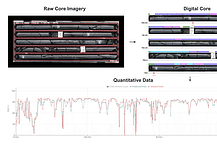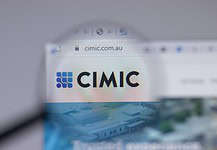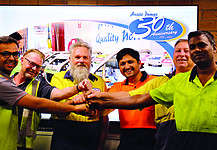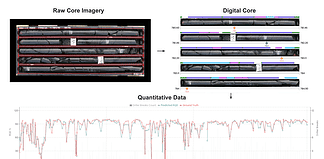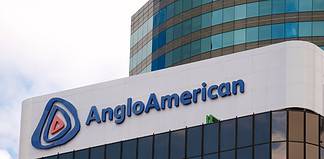Allied Heat Transfer offers a fully comprehensive end-to-end service for all heating and cooling of liquids for critical plant and equipment.
From design, to manufacture, to repair, it has the expertise and capability in everything from thermal mechanical design, recommendation, and supply of materials, to repairing and fabricating replacement components.
As well as manufacturing, repairing, and servicing parts, it also supplies a large range of stock products.
It holds parts for an extensive range of machinery for heavy equipment, from small coolers right through to large industrial radiators, fans and anything else with components found in cooling or heating units.
OEM parts for Australian conditions
AHT’s highly trained engineers and technicians are specialists in assessing OEM equipment that is either not working efficiently or not compliant to Australian standards. AHT are able to make recommendations including the manufacture of new componentry to ensure that the equipment operates both optimally and meets or exceeds Australian standards.
The new part is generally more suitable to the conditions the machine operates under, giving improves performance than the original and fulfilling the company’s promise to ‘make it better, save money, make it compliant and ensure it works’.
Allied Heat Transfers COO Peter Constantine said that often machinery that has been purchased for a particular function is not actually fit for purpose when exposed to Australian industry conditions.
Machines not designed for the ambient or actual conditions will not function well and parts will fail quickly.
This is particularly prevalent when a machine designed and manufactured in Europe or the US is installed in an underground mine in Australia and expected to function in dusty and overheated conditions beyond its capabilities.
Under these circumstances, componentry within the machine will fail quickly and will continue to fail when replaced with the same part from the OEM.
Allied Heat Transfer offers companies a better alternative than simply replacing the part with an identical component and instantly experiencing the same problems.
It can manufacture and replace the part with an Australian-compliant component that is not just Australian-specific but has site-specific compliance and is environmentally suited to the conditions.
Allied Heat Transfer uses its deep knowledge base in thermal mechanical design, along with experience of the conditions and machinery, to find solutions to the problem of non-compliant imported equipment.
Its capability includes repair and improvement of major oil and gas componentry, such as larger shell and tube units that may be manufactured with exotic materials and constructed using exotic procedures.
When these types of parts fail due to non-compliance or unsuitability to the environment or function, AHT will conduct all procurement in house covering designing, drafting, and engineering.
“We go from a very simple machinery, right up to refinery equipment with extremely specific requirements,” Mr Constantine said.
“Too much performance will cool the fluids too much, yet you can’t cool them too little, and overperformance is not accepted either. Allied Heat Transfer is an expert at attaining the specific point of accuracy required that meets all parameters.”
Conversation and consultation are key
Engaging in extensive conversations with clients is the key to manufacturing the component specifically as required.
By consulting in depth, the company ensure that they receive all the information they need and that is available. This includes flows, materials, and the make-up of the fluids.
AHT is unique in being able to use highly skilled non-destructive reverse engineering to establish the materials and design of overseas-made components, and then manufacture a compliant variant component using the correct procedure.
The new unit will meet or exceed Australian Standards and provide increased performance which saves clients time and money and ensures better production performance.
The company has developed a process involving data, material performance and a deep knowledge of thermal conductivity alongside a range of specific testing procedures.
This process allows it to ascertain how and with which material a component is manufactured and thereby reproduce a matching component that performs at a higher level in the machine.
“There is a lot of consultation at that level through all of it,” Mr Constantine said.
“To match the component with the environment, it is important that we understand the exact conditions the machine is working in, whether it is humid, whether it is high altitude or whether it is explosive for example. The environment determines the materials that are used and how the cooling function will work.”
Allied Heat Transfer stands out in the industry by the level of consultation it undertakes and its ability to then create a product rather than relying on off-the shelf units that may not be suitable.
Meeting compliance and more
Compliance in componentry is becoming an increasingly important issue in Australia.
Australian vessel codes, standards and compliance including site compliance and mine safety is of paramount consideration in the resources industry and is among the strictest in the world.
AHT products are built strictly to Australian Standards, meeting or exceeding boiler and pressure vessel codes on the mechanical side, and TEMA standards for thermal parts.
All pressure vessels need to be assessed for hazard levels.
This involves specific calculations to determine the hazard level assessment of the components, which then establishes the class and the construction requirements.
Once built, the vessel needs to be inspected and registered under the appropriate guidelines.
Allied Heat Transfer is able to perform all the appropriate assessments to meet the necessary requirements.
Its speciality is recreating parts that come from the US or the EU and bringing them up to the stricter Australian standards.
With regular on-site inspections identifying non-compliant units, Allied Heat Transfer has its work cut out for it to keep companies componentry in line with specific requirements.
Ensuring compliant componentry helps customers keep production flowing without unexpected downtime caused by inspectors finding its units do not meet Australian standards.
AHT ‘s comprehensive and versatile services range from a simple part replacement provider to an extreme engineering service, reaching at least six market segments and making it unique in the thermal parts industry.
Case Studies
- Thermal analysis

Allied Heat Transfer has observed that often imported equipment is not designed to handle the conditions found around Australia, particularly with cooling systems.
As part of its specialisation, AHT has the capabilities to review an existing system that has been identified as not performing, and design and manufacture a unit that will address the shortfall.
In the vast majority of cases it is able to do this in the same or in a smaller footprint.
A client asked for assistance with a number of identical drill rigs imported from overseas in which the radiators were not able to meet the temperature requirements at site.
The cooling packages were combined with radiators, compressor oil coolers, and hydraulic coolers in the same package cooled by a single fan.
AHT assessed and identified that the radiator was too small.
However, the customer could not accommodate a larger cooling package.
AHT solved the issue by designing a replacement compressor oil cooler that was smaller yet provided the same amount of cooling as the larger model.
It was able to supply and fit a larger radiator into the same package, as well as utilising the existing fan and motor.
Allied Heat Transfer provided an upgrade to the existing cooling system to increase the ambient capabilities of the drill rigs without any major modifications, saving costs and downtime.
The customer was able to work continuously without the machine overheating and stopping.
- Compliance analysis

All pressure equipment is hazardous and is required to meet specific regulatory requirements based on the hazard level determined by a competent person.
An observation Allied Heat Transfer has made is that equipment usually considered not necessary to comply with these standards in fact does, such as air compressors on rigs which have oil coolers to maintain a suitable oil operating temperature.
These coolers are rated to the same pressure as the compressor which can be as much as 500psi.
Equipment that is typically recognised as being pressure equipment, such as receivers and separators, is usually operated well within the legislated requirements.
Equipment that is not typically recognised, such as the compressor oil coolers, often is not.
Allied Heat Transfer focuses on ensuring all that the equipment it designs and manufacture is compliant with the requirements and receive full attention to engineering design, type testing, and third-party verification.
An example of a cooler that falls within pressure vessel legislation but may not be realised as such is the compressor oil cooler fitted to most V-Packs.
- Fuel savings from improved intercooler package

The client requested help with a drill rig that was suffering overheating of the charge air cooling circuit, leading to de-rating of the engine and reduced power.
AHT analysed the existing package and found the layout was causing heated air from one cooler to recirculate and preheat the cooling air entering the charge air cooler.
This preheating of the cooling air meant the charge air cooler was unable to perform as required.
To rectify the issue, AHT designed and manufactured a new charge air cooler that could be mounted elsewhere on the rig.
The new design worked so well that the customer reported a saving of hundreds of litres of diesel a day.
The new charge air cooler saved so much outlay it paid for itself in only a few months, after which it provided a saving on expenses.
Allied Heat Transfer’s unique ability to redesign the scope of equipment saves companies many hours of downtime and produces higher performing machines better suited to Australian conditions.


